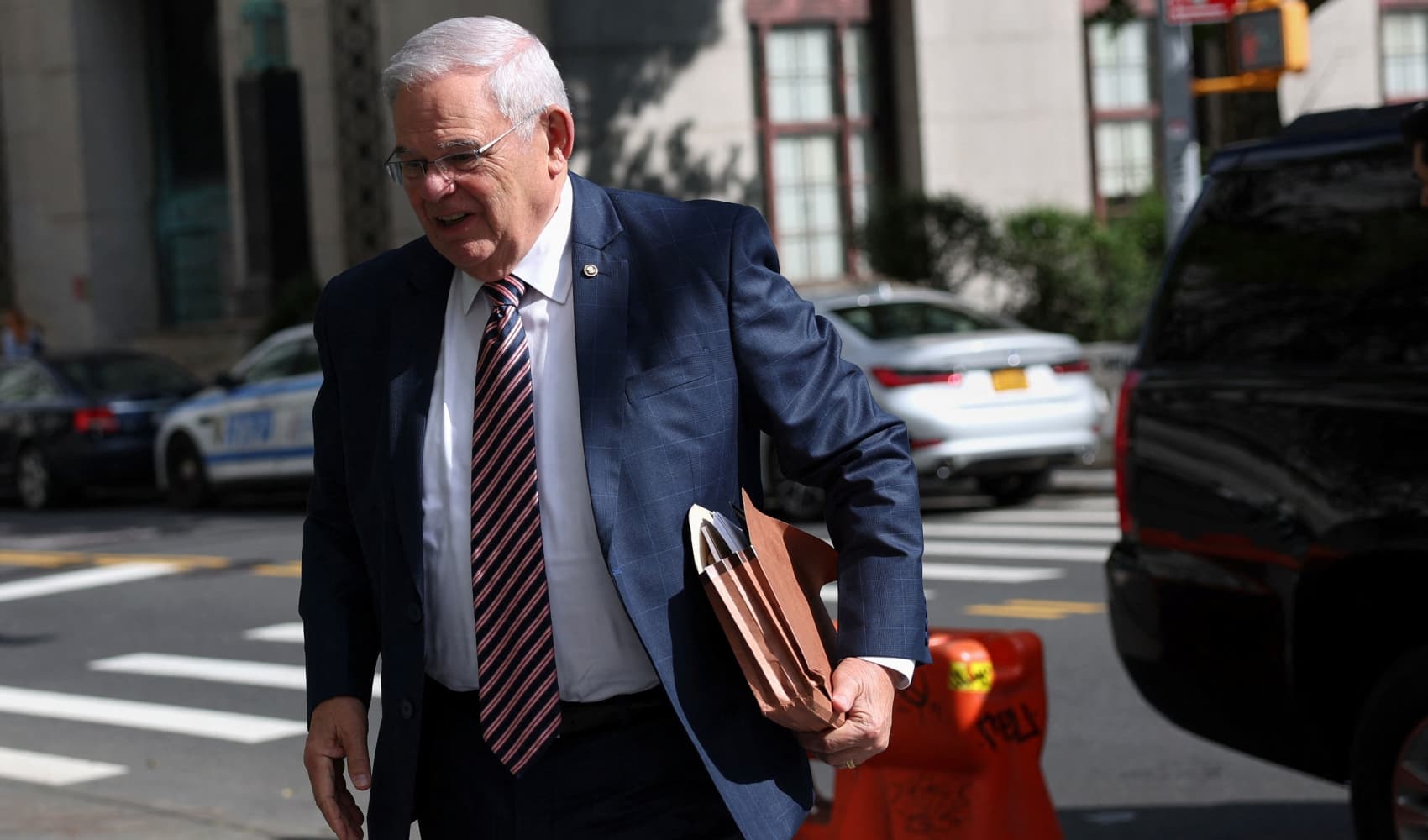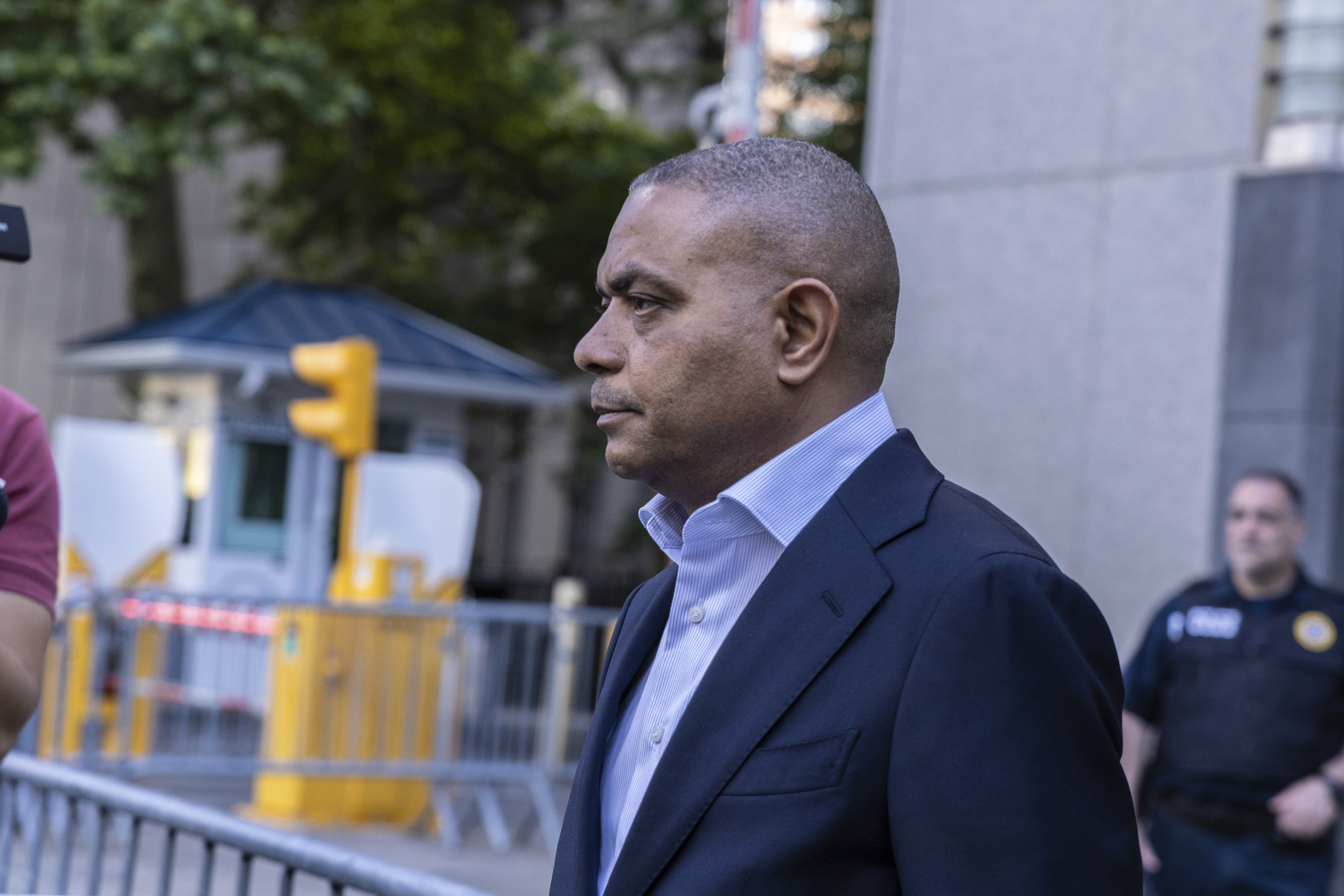New Jersey’s top federal prosecutor testified Wednesday at Sen. Bob Menendez 's bribery trial that the Democrat sought to discuss the prosecution of a New Jersey real estate developer with him before recommending him to the post after Joe Biden won the 2020 presidential election.
U.S. Attorney Philip R. Sellinger’s revelation in testimony that will continue on Thursday represented the second time in the five-week-old Manhattan federal court trial that a top law enforcement figure has said Menendez sought to speak about a criminal case affecting a New Jersey businessman.
Last week, a former New Jersey attorney general testified that Menendez twice confronted him about a pending criminal case affecting a New Jersey businessman, and both times the attorney general refused to discuss the subject.
Prosecutors say trying to intervene in criminal cases was one way Menendez, 70, tried to reward businessmen who paid him and his wife bribes of gold bars, tens of thousands of dollars in cash and a car.
When prosecutors charged Menendez, his wife and three businessmen last fall, they said in court papers that Menendez recommended Sellinger as U.S. attorney because he believed he could influence Sellinger to protect Fred Daibes, a prominent New Jersey real estate developer and longtime friend who faced federal criminal charges.
Get Tri-state area news delivered to your inbox.> Sign up for NBC New York's News Headlines newsletter.
Daibes is standing trial with Menendez, along with another businessman, Wael Hana. All three have pleaded not guilty. A third businessman, Jose Uribe, completed four days on the witness stand on Wednesday after pleading guilty and agreeing to testify against the others.
A trial for Nadine Menendez was postponed on Wednesday until at least August, depending on the pace of her recovery from surgery for breast cancer. She too has pleaded not guilty.
Sellinger, who has held New Jersey's top federal law enforcement post since December 2021, is not accused of any wrongdoing. He testified that he had been friends with Menendez since the early 2000s when he began contributing to his campaigns for Congress and held political fundraisers for him.
The relationship grew over time as they increasingly had dinners together and played golf with their sons, and Sellinger came to believe that Menendez would nominate him to be New Jersey's top federal prosecutor if Hillary Clinton won the 2016 presidential race, he said.
When Menendez got married in the fall of 2020, Sellinger attended the wedding, where he also had seen Daibes, Sellinger testified.
After Joe Biden won the 2020 election for president, Sellinger said he met with Menendez in his Washington office to talk about the U.S. attorney post. He said he shared his vision for the office.
Then, he said, Menendez mentioned that Daibes had a criminal case and that the senator believed he “was being treated unfairly.”
“And he said he hoped that if I became U.S. attorney, I would look at it carefully,” Sellinger recalled.
Sellinger said he told Menendez that he didn't know anything about it and that he planned to look at all cases in his office carefully.
The following day, Sellinger said, he called Menendez after recalling that he had dealt with a lawsuit that was adverse to Daibes while he was in private practice and that the Justice Department might decide to recuse him from anything involving Daibes as a result.
Sellinger recalled that Menendez said he understood, but days later, the senator told him that the White House wanted several potential candidates to be offered for nomination and he had decided he would no longer recommend Sellinger for the post.
When Sellinger learned a few months later that the person in line to get the job was no longer going to get it, he said he reached out to Menendez to remind him that he was still interested.
He said he then received a call from a political consultant who had formerly been director of Menendez's New Jersey office and was asked about his plans for the U.S. attorney's office if he got the job.
Sellinger said he repeated what he had told Menendez, including that he expected he might be recused from the Daibes case as a result of his work on the lawsuit affecting him. Even so, though, Sellinger said Menendez told him in the spring that he was recommending he be nominated for the job.
After he was sworn in, Sellinger said, he referred his potential conflict of interest regarding Daibes to the Justice Department in Washington on his first day as U.S. attorney and was told the following week that he must have nothing to do with the case.
Three months later, he said, the political consultant asked to meet him for lunch and, after general conversation about the job, said he wanted to ask him a question.
“I said: ‘Let me stop you there,’ ” Sellinger testified. “As U.S. attorney, I'm not allowed to have any conversations about the official business of the office with any elected federal officials or their representatives.”
Sellinger said he called Menendez in spring 2022 to invite him to speak at a public ceremony celebrating Sellinger's appointment as U.S. attorney.
“He said: ‘I’m going to pass,’ ” Sellinger recalled.
Sellinger said the senator then said: “The only thing worse than not having a relationship with the United States attorney is people thinking you have a relationship with the United States attorney and you don’t.”
Assistant U.S. Attorney Lara Pomerantz asked him what he understood Menendez to be saying.
“We no longer had a relationship,” Sellinger said.
On cross-examination that will continue Thursday morning, defense attorney Avi Weitzman asked Sellinger if Menendez in the past 20 years had ever asked him to do anything improper.
“I never believed him to be asking me to do anything improper or unethical,” Sellinger answered.




